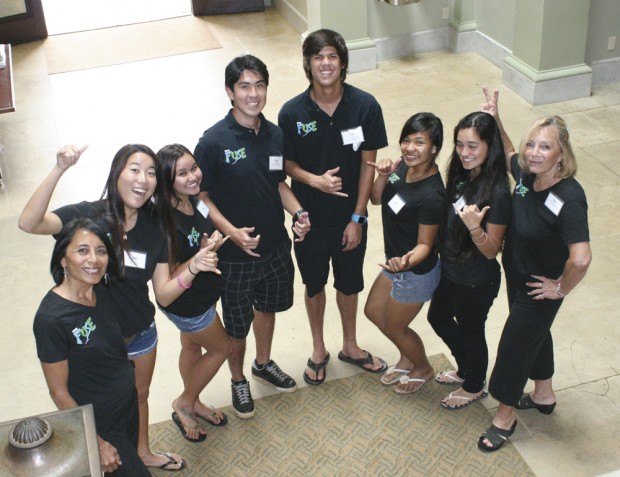LIHU‘E — Whoever said fun and work don’t mix forgot to tell it to a group of high school students who had the time of their lives while developing an entire business model using cutting-edge sustainable ideas. A group of
LIHU‘E — Whoever said fun and work don’t mix forgot to tell it to a group of high school students who had the time of their lives while developing an entire business model using cutting-edge sustainable ideas.
A group of about 20 Kapa‘a High School students joined efforts to create 808 FUSE (Fun Using Sustainable Energy), an online virtual business deeply rooted in sustainability.
“We knew that as a company we wanted to strike the match to light the fuse to sustainability, because we realized that you can’t spell sustainability without the ‘aina,” said 808 FUSE Administrative Assistant Bryanna Pacleb, a high-school senior about to graduate.
“You may be wondering … how is it that these high-school kids are creating a business,” 808 FUSE CEO Kristel Guino told Kaua‘i County Council members Wednesday.
Guino and Pacleb, along with a few of their classmates, showed the council how 808 FUSE developed from an idea of building a fun business into a full-grown sustainable enterprise.
Their business concept, including policy on conflict resolution, impressed the council so much that Council Vice Chair JoAnn Yukimura asked to borrow the 808 FUSE employee handbook.
The business also gained the attention of county Office of Economic Development Director George Costa, who said he was “impressed and moved” by the virtual company the students created.
“I often meet with adults who want to start a business,” said Costa, adding he hopes some of these young minds about to go to college will one day return to Kaua‘i and implement similar ideas here.
Guino said 808 FUSE is one of several hundred classes that are part of the California Virtual Enterprise program, where students create and run an online virtual business.
“While I say we are one of several hundred classes, we are still the only class in Hawai‘i,” Guino said.
The students decided to create a business based upon a need to have “something fun” to do, she said. 808 FUSE is a business that incorporates a Go-Kart track, a laser-tag facility, an arcade and an “organic” restaurant and snack bar.
As the business plan developed, students started to look into the concept of sustainability, which took them “deeper and deeper into what sustainability is all about and what it means to Kaua‘i,” Guino said.
Pacleb said she found some “sobering” information reported by the Environment News Service 2010.
“Hawai‘i imports about 45 million barrels of oil annually and burns over five million gallons of oil per day,” said Pacleb, adding that every minute, $6,500 leaves Hawai‘i’s economy to pay for imported oil.
“We realized that we certainly did not want to add to this figure,” she said. “All that oil just to meet 90 percent of our energy needs. It costs nearly $10 million daily to purchase that oil.”
Additionally, she said, each resident in Hawai‘i produces roughly 18 tons of carbon dioxide each year.
808 FUSE Vice President of Technology Shane Nishioka-Healy said the Go-Karts are built with recycled metals and plastics, and fueled by hydrogen-powered fuel cells. The laser-tag guns are solar-powered and recyclable, reducing battery waste, and the arcades use photovoltaic electricity generated on-site, he said.
808 FUSE Food and Beverage Developer Kaylyn Armstrong Shiira said that after researching with University of Hawai‘i College of Agricultural and Human Resources, she found that 85 percent of the food consumed in Hawai‘i is imported.
“That’s a staggering $3.1 billion that is going to support business elsewhere,” she said.
“If we replace just 10 percent of these imported goods, then $188 million in sales, $47 million in earnings and $6 million in state tax revenues would stay in Hawai‘i to support our agricultural business, not to mention create more than 2,300 local jobs.”
The goal of 808 FUSE’s food and beverage department, Shiira said, was to design a menu that guarantees that 85 to 90 percent of the food comes from local producers.
“The idea is garden to the table,” said Shiira, adding that the business’ gardens would provide the majority of the food, with the remaining coming from local farmers.
808 FUSE Public Relations Coordinator Joni Esaki said about 50 percent of all carbon dioxide emissions comes from buildings. “So we wanted to focus on green and sustainable practices,” he said.
Esaki said 808 FUSE Architect and Landscaping Designer Reginald Aragan designed a building that incorporates a geodesic dome, without wood and built with magnesium oxide — a non-toxic alternative to traditional drywall — and volcanic rock.
The dome would also have a special film that captures the sun’s rays to generate electricity, Esaki said.
A botanical garden irrigated with captured rainwater, wood flooring made with materials certified by the Forest Stewardship Council, used-glass countertops and recyclable paper and other materials are also incorporated into the building’s design.
“We all need to walk the talk if we truly want to save our islands and our planet,” Guino said.
“This business has shown us that while we all want to have fun, we need to be smart about it before we lose all that we have.”
Christine Farina and Merlyn Craddock, from Kapa‘a High School staff, guided the students in developing 808 FUSE.
• Léo Azambuja, staff writer, can be reached at 245-3681 (ext. 252) or lazambuja@ thegardenisland.com.


